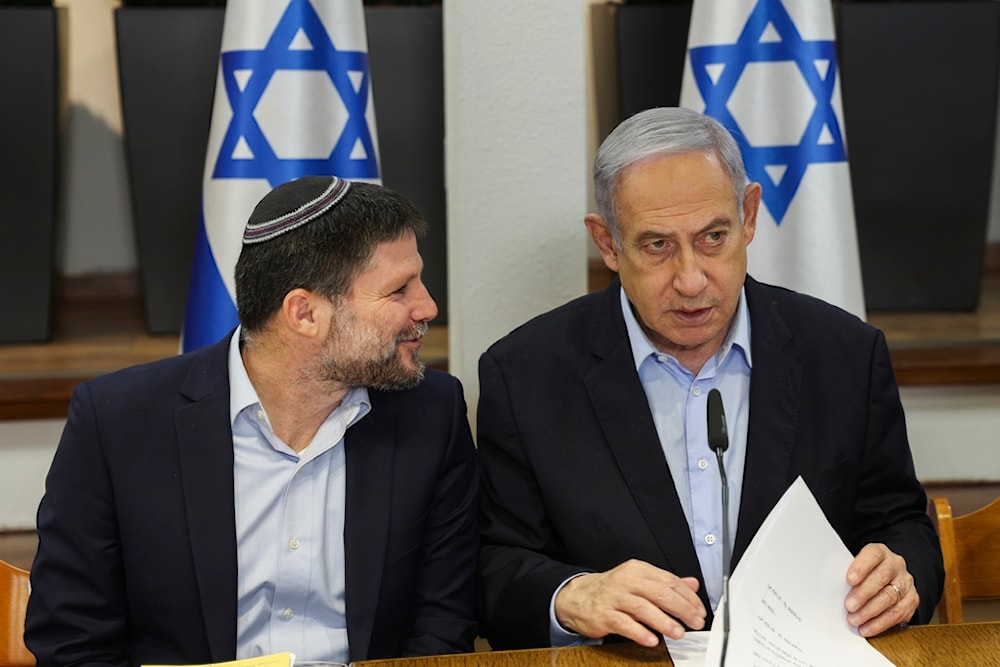Netanyahu struggles to restrain genocidal remarks in cabinet: Politico
Netanyahu is currently faced with serious challenges ahead of the next hearing, with a primary issue being is his apparent inability to silence provocative voices within his Cabinet.
-

Israeli Prime Minister Benjamin Netanyahu speaks with Minister of Finance Bezalel Smotrich during the weekly cabinet meeting at the Security Ministry in "Tel Aviv," Palestine, Jan. 7, 2024 (AP)
The ICJ's scrutiny of rhetorical dehumanization of Palestinians has led Israeli Prime Minister Netanyahu to urge restraint in language once more among members of his extremist cabinet, yet some members continue with provocative remarks, Politico reports on Friday.
When the court issued its decision to issue interim orders for the Israeli regime, extremist elements within Netanyahu's government, known for controversial remarks, were explicitly cited. These included Internal Security Minister Itamar Ben-Gvir and Finance Minister Bezalel Smotrich, among others.
Prior to the hearing, Netanyahu cautioned extremists within his coalition to pipe down and "be careful with their words," noting that "every word has meaning when it comes to diplomacy."
Read more: 'Israel' in toughest of times, strategic goal unachieved: IOF official
Despite calls for caution, Minister Gideon Sa’ar publicly declared that Gaza should be smaller after the war, and those who initiate a war against "Israel" must inevitably lose territory. Minister of "Heritage" Amihai Eliyahu further sparked international outrage by contemplating the use of a nuclear bomb on Gaza, later claiming it was "metaphorical."
After the charges concluded that "Israel" is indeed engaged in acts of genocide, Ben-Gvir condemned the court's decision as "anti-semitic," while Netanyahu himself called the charges untrue and "outrageous."
The report states that Netanyahu is currently faced with serious challenges ahead of the next hearing. A primary issue is his apparent inability to silence genocidal voices within his Cabinet, the Politico report notes.
Over the weekend, ministers and lawmakers participated in a pro-settlement conference in occupied Al-Quds, advocating for the building of Israeli settlements in Gaza post-war. This contradicts Netanyahu's claim that "Israel" has "no intention of permanently occupying Gaza or displacing its civilian population."
Read more: US Federal judge: Israeli actions may amount to genocide
Some observers point out that extremist coalition partners may not want to trigger a regime collapse but may seek to weaken centrists and force them to leave the war cabinet.
Netanyahu's second challenge involves the worsening humanitarian crisis in Gaza. With "Israel" throttling back its military aggression, this enabled the resistance to regroup its forces in the North of the Strip.
This poses a serious dilemma for Netanyahu as resuming airstrikes to weaken the resistance may exacerbate the humanitarian crisis, putting him once again at odds with the ICJ.
The day after the ICJ issued its ruling, multiple Western donors opted to suspend funding for the UNRWA agency, the main support for Gaza's civilian population. This move was prompted by the alleged involvement of 12 staff members in the resistance. As a result of this, the humanitarian situation in Gaza is expected to deteriorate in the coming days.
Read more: Hamas, PIJ chiefs hold talks on Operation al-Aqsa Flood

 3 Min Read
3 Min Read








